The missionary vision of William Fetler led to starting the first Bible School in Riga. You can see this vision woven into the architecture of the fully renovated old building.
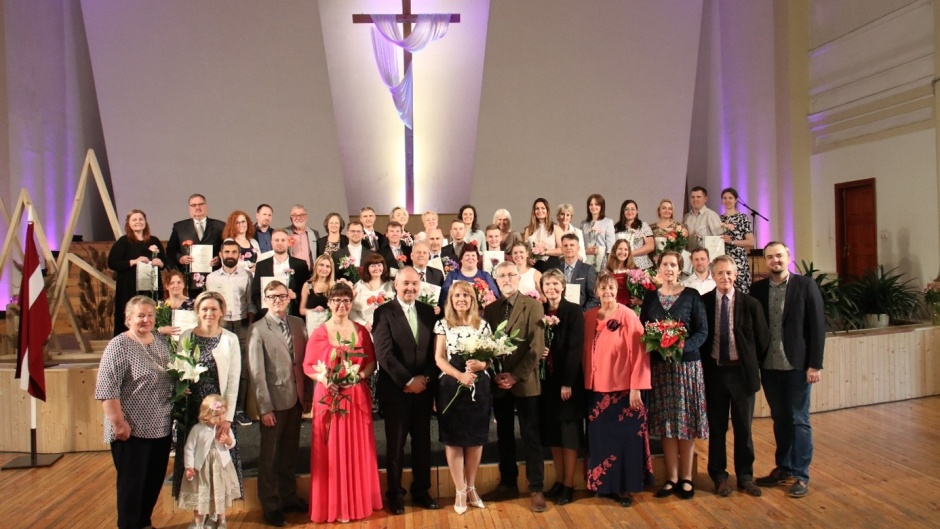 The LBC graduating class 2022 with their instructors and teachers. / LBC
The LBC graduating class 2022 with their instructors and teachers. / LBC
The famous Evangelist and Church planter in the Russian Empire and the independent Latvia after 1919, William Fetler (1883-1957), started numerous churches in the country and formed the first Missionary and Bible School of Riga in 1924 to prepare trained evangelists and church planters for the Baltic countries and beyond. He was especially interested in training missionary personnel for the Soviet Union.
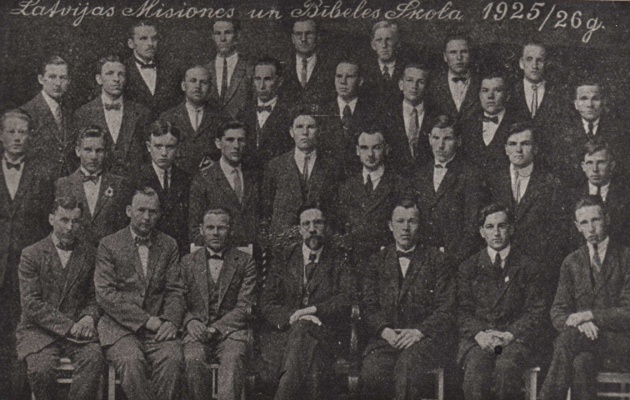
[photo_footer] The first graduating class of RBI in 1926. [/photo_footer] The school became a spiritual center in Riga, the capital city of Latvia, and welcomed students from various regions of the former Russian empire [1]. There are many exciting stories of the graduates of this school. However, the school ceased to exist in 1935.
In 1939, the Soviet Army occupied Latvia and thus no theological evangelical education was possible anymore. In all those religiously dark years of the Soviet Union there was not one official theological school in Latvia. Only a few evangelical pastors were able to receive their education in the Moscow-based Theological Extension Courses of the Evangelical Christian Baptist Union, which opened in 1968 or abroad. Some churches, however, organized illegal trainings for their pastors and theologically interested young people.
In 1985, Mikhail S. Gorbachev became the eighth General Secretary of the Communist Party of the Soviet Union and with him the attitude of the authorities towards the church softened. In the year 1985, the German mission agency Logos International started an unofficial theological training program in Riga, offering programs developed by the International Correspondence Institute (ICI), later renamed to Biblical Education by Extension (BEE).
When in 1991 Latvia declared her independence from the Soviet Union, the Latvian government introduced the freedom of religion. Theological education was again possible. And one year later, in 1992, the BEE Courses in Riga were registered as the Riga International Bible Institute (RIBI) under the leadership of Gennadij P. Zavalii. The story of the Latvian Biblical Center (LBC) began.
RIBI primarily served the Russian churches in Latvia. But Russian-speaking Evangelicals in large numbers left Latvia after the declaration of independence, most of them to North America. The numbers of students dropped considerably, so the leadership decided to expand the program both to Latvian and international students.
In 2006, Drs. Esther and Vitaly Petrenko joined RIBI and became the leaders of RIBI in 2008. Vitaly, a Ukrainian/Latvian, and Esther, born and raised in Portugal, had met in Great Britain where both were studying theology. They married and moved to Riga.
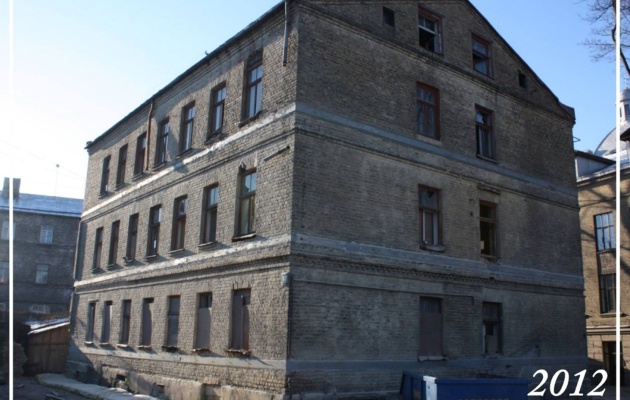
[photo_footer] The building of LBC in 2012.[/photo_footer] Since then the numbers of people enrolled in one of the training programs increased year by year, bringing the total number of graduates today to about 1,200. Quite a number of them have become pastors of Latvian churches, others serve the Lord in neighboring countries or as missionaries overseas. RIBI was renamed into Latvian Biblical Center (LBC) and some other training centers in other Latvian cities were added. At the same time special programs, serving the interest of the church leadership such as counselling, found broad acceptance in churches of different denominations.
Ten years ago the LBC acquired the original building in which Fetler had started his school in the first half of the 20th century. This move into the now fully restored building of the former Missionary and Bible School underlined the spiritual historic roots of LBC. And this was clearly recognized by Evangelicals throughout the country. No other interdenominational institution in Latvia enjoys such a broad acceptance and support as LBC does. The enormous success of LBC is clearly the work of its leadership and here especially of Drs. Esther and Vitaly Petrenko. Now after 16 years of serving in Latvia, the couple will pass on the responsibility to younger people and move to Portugal.
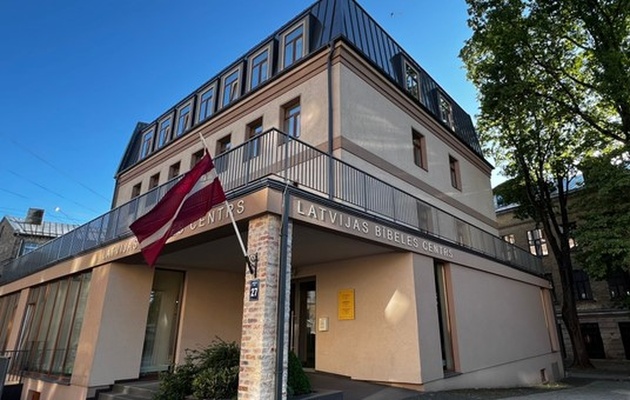
[photo_footer] The home of LBC today.[/photo_footer] On Saturday, June 18, LBC celebrated its 30 years of faithful serving the church in Latvia. Guests from all parts of the country, from Great Britain, the US and Germany were present. Even its first director, Gennadi Zavalii, flew in from New York where he lives today. The celebration started with a wonderful graduation ceremony. 41 students graduating from programs in theology, church ministries, preaching and counselling successfully finished their studies. The counselling program, the youngest of all LBC programs offered together with the Peace and Reconciliation Network (PRN) of the World Evangelical Alliance (WEA) was able to graduate 49 students. Dr. Johannes and Cornelia Reimer of PRN were present and congratulated the students. The success of the school leads to the continuation of the program in the near future.
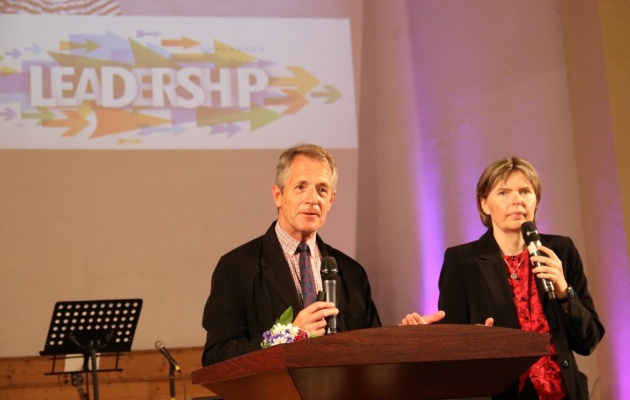
[photo_footer] Dr. John Wood, London, Chair of LBC´s board of directors, with intepretor. [/photo_footer] Both teachers and students excitedly reported about their experiences at LBC. Dr. John Woods, Spurgeon College, London, the current chair of the board of directors of LBC, rightly brought it to the point when he stated that it is Jesus, admired and taught at LBC, who sets the path of the school and determines the values and culture of the school. And where Jesus is, excitement will follow, Woods said. Grace becomes a reality one experiences.
Literally all the speakers at the jubilee conference underlined the fact that LBC is proof that God's grace present in a project which needs a miracle in order to be realized and become successful was evident in every move LBC´s leadership made. “You want to see God´s grace at work? Come to LBC!” a leading Baptist pastor said. “The government, many religious leaders, even some Evangelicals did wish this college would never develop well. But God wanted this school. And now we celebrate 30 years. It is all grace – what else?!”
It was the missionary vision of William Fetler which led to starting the first Bible School in Riga. You can see this vision woven into the architecture of the fully renovated old building: the shape of the classrooms, the library ambience, even a little Fetler museum. “You can´t miss his spirit”, says one of the visitors attending the celebration in Riga. “Fetler is everywhere and so is mission, evangelism, and church planting.”
“We have designed our school as a missionary college”, says Dr. Vitaly Petrenko. “Our students are here to carry the flame of mission into the future. Latvia is a small country, one of the smallest in the European Union, but Latvia is strategically best placed. Next door to Lithuania, Estonia, Russia, then Belarus, Ukraine and across the Baltic See to Poland and the countries of Western Europe, the missionary chances are enormous, and our school accepts the challenge,” Vitaly Petrenko says. It is his dream that the College deepens the missionary vision of the Latvian churches and encourages them to intensify their evangelistic outreach and missionary work in and outside of Latvia. The celebration of 30 years of God’s grace in Riga proves that this vision is in every regard realistic.
Currently both the staff and the students of LBC are heavily involved in a ministry to Ukrainians, both in the country in war as well as among the Ukrainian refugees living in Riga, many of them in the premises of the school. “We were able to host about 100 families in the last four months. Even our library became a bedroom for Ukrainian families”, Dr. Petrenko explains. The counselling program offered trauma therapy to highly traumatized Ukrainians and even sent one counsellor to Poland to assist the evangelical team in Warsaw. “We drove our old school bus to Ukraine 15 times, bringing medicine and other aid to the suffering people. More than 60,000 Euro were raised for Ukraine. We teach our students wholistic mission and all our teaching has to happen in the context of real life. The crisis in Ukraine is just one of our practical involvements to reach out to people and show them God´s grace.”
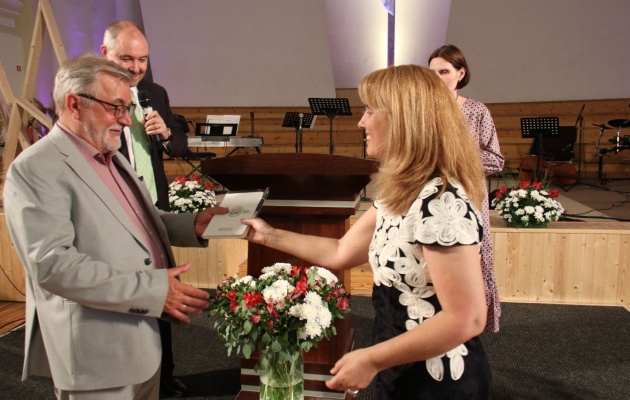
[photo_footer] Dr. Esther Petrenko thanks WEA/PRN for their engagement in LBC [/photo_footer] With this attitude LBC will obviously walk into a great future. “God´s grace is with us”, one of the college teachers says. “There is no space for fear and God´s miracles will become reality as they have been seen in the past 30 years.” Bless you, LBC!
Johannes Reimer is professor of Mission Studies and Intercultural Theology and Director of the department of Public Engagement of the World Evangelical Alliance (WEA).
1. See the story of William Fetler in: John Wood: Born in the Fire. The story of William Fetler alias Basil Malof (1883-1957): church planting evangelist in Russia and Latvia. https://www.bible.lv/system/user_files/Documents/William%20Fetler_John%20Wood.pdf.

Las opiniones vertidas por nuestros colaboradores se realizan a nivel personal, pudiendo coincidir o no con la postura de la dirección de Protestante Digital.
Si quieres comentar o